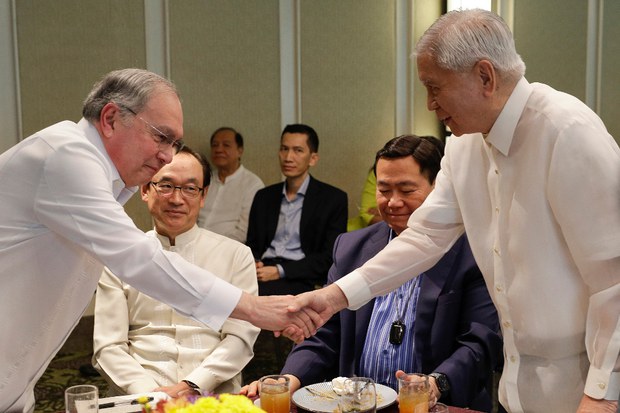Philippines Working with US to Salvage Defense Ties, Ambassador Says
2020.02.28
Manila
 Jose Manuel Romualdez, Philippine ambassador to the United States, (left) shakes hands with former Philippines Foreign Secretary Albert del Rosario, during a security forum in Manila, Feb. 28, 2020.
Jose Manuel Romualdez, Philippine ambassador to the United States, (left) shakes hands with former Philippines Foreign Secretary Albert del Rosario, during a security forum in Manila, Feb. 28, 2020.
Updated at 4:40 p.m. ET on 2020-02-28
Philippine and U.S. defense officials and diplomats are working to salvage a defense alliance after President Rodrigo Duterte ordered the country to drop out of a bilateral visiting forces agreement, the country’s envoy to Washington said Friday.
Ambassador Jose Manuel Romualdez told a security forum in Manila that a new agreement could take the form of a limited military engagement that could be similar to Philippine alliances with Australia and Japan.
“We are now in the process of thinking how we can come up with a similar agreement,” Romualdez said.
“Needless to say, specifically the members of the U.S. Pentagon are extremely concerned about the VFA being terminated and how we will work,” bilaterally on defense matters, he said, using the acronym for the Visiting Forces Agreement.
The U.S. “is a major country that no one can ignore including China,” Romualdez said, underscoring that the VFA was not the “be all and end all” of bilateral defense cooperation.
His statement came a day after a Philippine military spokesman said the country can quell security threats without Washington’s help.
The Feb. 11 announcement that the Philippines was leaving the VFA was in reaction to the U.S. government cancelling the visa of Sen. Ronald dela Rosa, Duterte’s former national police chief who implemented the first phase of the nation’s drug war that has left thousands dead.
U.S. President Donald Trump has downplayed the effects of the pact’s termination, saying his country would save money in the long run. It was also the Philippines’ loss, Trump said, emphasizing that U.S. troops helped drive militants linked to the Islamic State from the southern city of Marawi three years ago.
Romualdez said diplomats and defense officials of both countries would continue discussions and come up with recommendations to be given to Duterte, who earlier this week said that the Philippine military could stand up on its own.
The VFA will be terminated in August, 180 days after the Feb. 11 announcement. Romualdez did not say if negotiators would be ready with recommendations before then.
The VFA, adopted in 1999, allowed for large-scale joint military operations on Philippine soil years after the government decided to end the lease agreement on two major U.S. military bases a few years earlier. U.S. troops helped train Philippine forces against militants in the southern Mindanao region while assisting in blunting China’s aggressive actions in the contested South China Sea region.
![200228-PH-defense-inside.jpg A Philippine activist burns effigies of President Rodrigo Duterte, U.S. President Donald Trump and Chinese President Xi Jinping during a rally in Manila, Nov. 30, 2019. [Basilio Sepe/BenarNews]](/english/news/philippine/defense-discussion-02282020131026.html/200228-PH-defense-inside.jpg/@@images/d999bbe2-df3e-4325-94ff-d68ab96ef08e.jpeg)
Joint training
Even as negotiators discuss efforts to continue military support between the nations, the U.S. Department of Defense touted joint counterterrorism training exercises held in January and February in Palawan.
In a news release posted Thursday on its website, the U.S. Indo-Pacific Command noted that along with focusing on tactical skills, the training exercises would include outreach and civic-action programs in Filipino communities.
“With the knowledge and experience gained from training shoulder-to-shoulder, the U.S. and Philippine troops continue to hone their counterterrorism tactics and skills. The joint training also helps to tighten the longstanding bond between U.S. and Philippine military forces,” the news release said.
The U.S. State Department said it has received the notification from the Philippines.
"We are carefully considering how best to move forward to advance our shared interests," a spokesperson told BenarNews.
On Friday, retired Supreme Court justice Jose Antonio Carpio, a staunch critic of China’s occupation of the West Philippine Sea (the Philippine name for the South China Sea), said Manila could seek alliances beyond the United States to protect its territory.
“Under the United Nations charter, collective self-defense is allowed. We are allowed to defend our country against armed aggression,” Carpio said during the forum.
“We can enter into alliances to defend our country against China, which is actively occupying and invading our territory and the rest of the country, invading our maritime zones,” he said.
Alliances could be forged with Japan or South Korea, Carpio said, as he challenged Duterte for claiming the Philippines can act by itself without assistance in the face of China’s territorial threats.
“I cannot see how the Philippines can be self-reliant against a regional superpower with nuclear arms like China,” he said.








